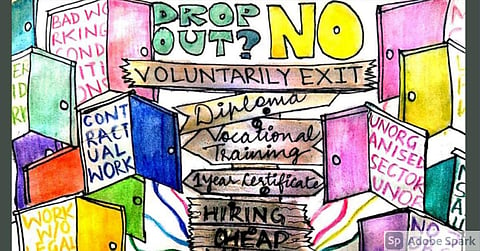

Ever since its announcement, the National Education Policy is being debated and dissected — while some hail the policy and find it beautiful, others have renamed it the National 'Exclusion' Policy as they feel the new policy will ostracise the marginalised sections of society. The members of the Delhi-based students' organisation called Collective, have come up with a dictionary of their own to explain major issues that the NEP has stressed upon.
The 52-page Dictionary of National Education Policy 2020 was articulated, edited and designed by the students of Delhi University, Jamia Milia Islamia, Ambedkar University and Jawaharlal Nehru University among others in just a week after the release of the NEP 2020. "Images are often quite distant from reality. A closer look at the document, as well as the track record of successive Indian governments in education, reveals that some of the very ideas that are causing much enthusiasm today, in fact, have very different meanings. It is not simply execution but also intent that must be held to scrutiny today," reads the introduction of the dictionary as it compares the draft NEP's cover picture with the reality.
"The terms that the NEP used sounded quite nice and progressive on paper. The flexible courses, the humanities and sciences' rigidity disappearing, focus on critical thinking and so on were the things that it stressed on. We thought we would bring out a dictionary to explain what the different words, which sound nice, actually imply. We started with this section on life-long learning which is being discussed now. Very few students, in reality, get to continue their education beyond Class 8, fewer get past the high school stage and a minimal number attempts higher education. The flexible courses with multiple exit options is just formalising the dropouts and calling them exit options," said Sourya Majumder, a student of Sociology at JNU.
Broadly, Sourya said, the NEP felt like privatisation and saffronisation of the education system. "Not only does the NEP bring in and increase the role of private players, but it also saffronises education. Although it talks a lot about reviving India's ancient knowledge systems, it does so on a very unscientific basis instead of actually investing in the ancient knowledge systems," he added. "Sanskrit is given more importance than other classical languages like Pali, Prakrit or even the regional languages. We have explained these in simpler terms by giving a history of what the policy has been over the years and what is being changed now," said Sourya.
The document not only looks neat but well produced with apt illustrations. You might or might not agree with them but it may definitely be something you'd want to leaf through.
